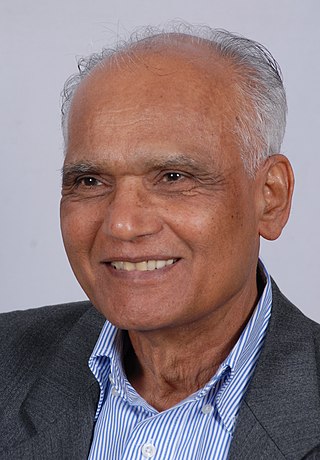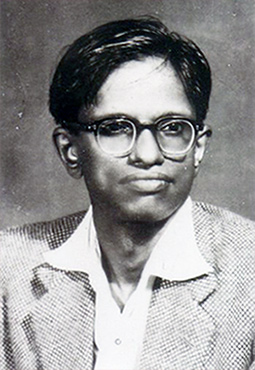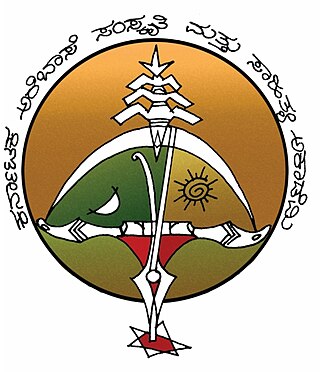| Abbreviation | KTSA |
|---|---|
| Formation | 1994 |
| Headquarters | Tulu Bhawana, Mangalore |
| Location | |
Region served | India |
President | Dayananda G. Kathalsar ( 2019- |
| Publication | Madipu |
Parent organisation | Kannada and culture department, Government of Karnataka |
| Website | tuluacademy |
Karnataka Tulu Sahitya Academy is an organisation under Government of Karnataka for promotion of literature in Tulu language. Established in 1994 by Government of Karnataka, it is an autonomous organisation functioning from its own building - Tulu Bhawana in Mangalore, Karnataka.
The Karnataka Tulu Sahitya Academy organises workshops, seminars, cultural events and gatherings for Tulu public. It also provides research grants for research in Tulu language and culture; publishes books; and presents the annual awards in the fields of Tulu literature, Tulu folk arts, yakshagana, research and novel writing.
The Academy has a library which houses a good collection of books and magazines in Tulu and Kannada. It also publishes a monthly magazine by name Madipu.

The Kerala Sahitya Akademi or Academy for Malayalam literature is an autonomous body established to promote the Malayalam language and literature. It is situated in the city of Thrissur, Kerala in India.

Tulu is a Dravidian language whose speakers are concentrated in Dakshina Kannada and in the southern part of Udupi of Karnataka in south-western India and also in the northern parts of the Kasaragod district of Kerala. The native speakers of Tulu are referred to as Tuluva or Tulu people and the geographical area is unofficially called Tulu Nadu.

Kota Shivaram Karanth, also abbreviated as K. Shivaram Karanth, was an Indian polymath, who was a novelist in Kannada language, playwright and an ecological conservationist. Ramachandra Guha called him the "Rabindranath Tagore of Modern India, who has been one of the finest novelists-activists since independence". He was the third writer to be decorated with the Jnanpith Award for Kannada, the highest literary honor conferred in India. His son Ullas is an ecological conservationist.
Arebhashe or Aregannada or Gowda Kannada is a dialect of Kannada mainly by Gowda and other communities in the region Madikeri, Somwarpet, and Virajpet taluks of Kodagu district, Sullia, taluks of Dakshina Kannada district; Bangalore and Mysore districts in the Indian state of Karnataka. As well as Bandadka, Kasaragod District in the Indian state of Kerala, Arebhashe is also called Gowda Kannada. The language was recognized by the Karnataka State government and formed an academy in 2011 to preserve the culture and literature of the Arebhahse Region which is named as Karnataka Arebhashe Samskruthi mathu Sahitya Academy supported by then Chief Minister D. V. Sadananda Gowda.

Kannada Saahithya Parishath is an Indian non-profit organisation that promotes the Kannada language and its literature. Its headquarters are in the city of Bengaluru in the state of Karnataka, India. It strives to promote Kannada language through publishing books, organising literary seminars and promoting research projects. It also organises an annual conference on Kannada literature called Kannada Sahithya Sammelana. The current president of the parishat is Dr. Mahesh joshi.

The Sahitya Akademi, India's National Academy of Letters, is an organisation dedicated to the promotion of literature in the languages of India. Founded on 12 March 1954, it is supported by, though independent of, the Indian government. Its office is located in Rabindra Bhavan near Mandi House in Delhi.

Tigalari, also known as Tulu script, is a Southern Brahmic script which was used to write Tulu, Kannada, and Sanskrit languages. It was primarily used for writing Vedic texts in Sanskrit. It evolved from the Grantha script. It is called as Tigalari lipi in Kannada-speaking regions and Tulu speakers call it as Tulu lipi. It bears high similarity and relationship to its sister script Malayalam, which also evolved from the Grantha script.

Manjeshwar Govinda Pai, also known as Rastrakavi Govinda Pai, was a Kannada poet. He was awarded the first Rashtrakavi title by the Madras Government. Rashtrakavi M. Govinda Pai was the one who put Manjeshwara(now in Kerala) on the literary map of India.

Kayyara Kinhanna Rai was an Indian independence activist, author, poet, journalist, teacher and farmer.

Chandrashekhara Kambara is a prominent Indian poet, playwright, folklorist, film director in Kannada language and the founder-vice-chancellor of Kannada University in Hampi also president of the Sahitya Akademi, country's premier literary institution, after Vinayak Krishna Gokak (1983) and U.R. Ananthamurthy (1993). He is known for effective adaptation of the North Karnataka dialect of the Kannada language in his plays, and poems, in a similar style as in the works of D.R. Bendre.
Karimpumannil Mathai George (1914–2002), popularly known as Dr. K. M. George, was an eminent Malayalam writer and educator. An erudite scholar and literary critic with astute organisational capabilities, he is best known as a pioneer of Comparative Indian Studies and Literatures. He was a recipient of the fourth highest Indian civilian honour, the Padma Shri, the highest literary award of the Government of Kerala, the Ezhuthachan Puraskaram and the third highest Indian civilian award, the Padma Bhushan, besides other honours.
K.N. Ganeshaiah is an agricultural scientist and a Emeritus professor of the University of Agricultural Sciences, Bangalore. He is also a novelist specializing in thrillers, and writes in the Kannada language.

Santeshivara Lingannaiah Bhyrappa is an Indian novelist, philosopher and screenwriter who writes in Kannada. His work is popular in the state of Karnataka and he is widely regarded as one of modern India's popular novelists. His novels are unique in terms of theme, structure, and characterization. He has been among the top-selling authors in the Kannada language and his books have been translated into Hindi and Marathi which have also been sellers.
Beary or Byari is a Dravidian language spoken by the Muslim communities mainly of Karnataka and extreme northern end of Kerala like Manjeshwaram, Kunjathur, Uppala, Hosangadi of Kasaragod district (Byaris). Bearys speak a language made of Malayalam idioms with Tulu phonology and grammar. This language is traditionally known as Mappila Bashe because of Bearys' close contact with Mappila, the Malayali Muslims. Due to the intensive influence of Tulu for centuries, it is today considered close to both Tulu and Malayalam.
Karnataka Sahitya Academy Award is an annual literary award given to literary works in Kannada by the Karnataka Sahitya Academy. Karnataka Sahitya Academy Award is given to individual books published in various genres like poetry, novel, short fiction, criticism, travel writing, translation, children's writing etc., as well as for the complete contribution of a writer to Kannada literature.

Padigaru Venkataramana Acharya, also known by his pen name Langulacharya, was a Kannada and Tulu scribe, journalist, writer and poet who received the B.D. Goenka award for journalism in 1992.

M. K. Seetharam Kulal was an Indian Tulu-Kannada dramatist known for his work in the field of Tulu-Kannada dramas and also in the Tulu film world. He has given several skit performances at Sri Sharav Maha Ganapathi Temple, Mangalore.

Karnataka Arebhashe Samskruthi mathu Sahitya Academy is an organization under Government of Karnataka for promotion of literature in Arebhashe language. Established on 15 December 2011 by the Government of Karnataka. The purpose of the academy is to preserve and promote the Arebhashe language, Arebhashe literature, and Arebhashe culture. Which has a considerable population of Arebhashe speakers, a language minority in the state Karnataka and Kerala. Arebhashe is a dialect of Kannada spoken mainly by Gowda and other community in the region of Kodagu, Sullia of Dakshina Kannada in the Indian state of Karnataka as well as Bandadka, Kasaragod District in the Indian state of Kerala. The academy was formed by then Chief Minister D. V. Sadananda Gowda.
The Kodava Sahitya Academy is an organisation under the Government of Karnataka which preserves and promotes the Kodava language, literature and culture.
Pundur Venkataraja Puninchathaya, also known as P. V. Puninchathaya, was a scholar, teacher, author, and researcher who had made significant contributions to Tulu language and literature.